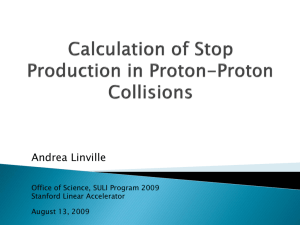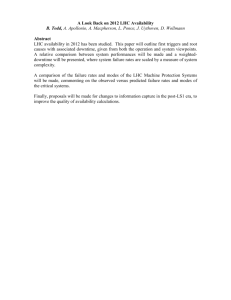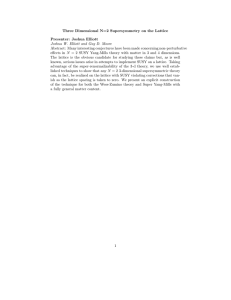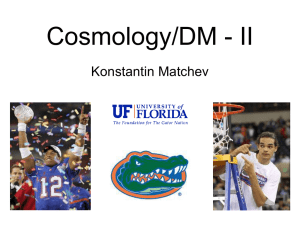S LHC – TeV–scale supersymmetry – Inclusive signals
advertisement
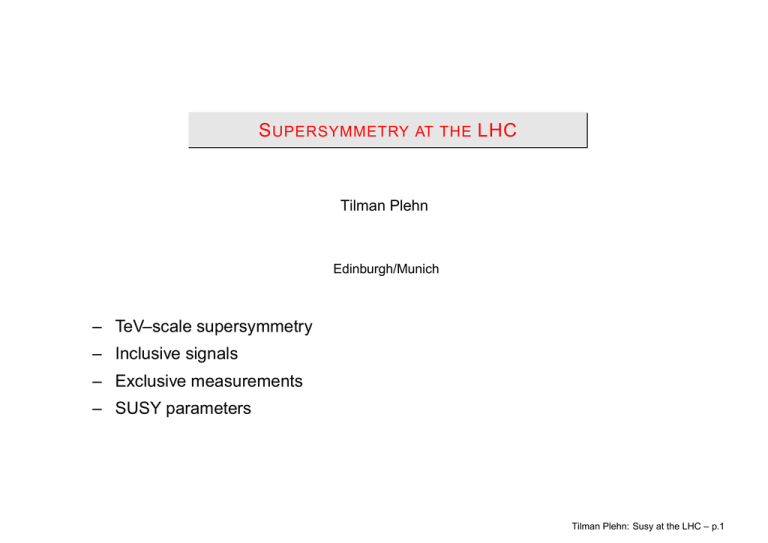
S UPERSYMMETRY AT THE LHC Tilman Plehn Edinburgh/Munich – TeV–scale supersymmetry – Inclusive signals – Exclusive measurements – SUSY parameters Tilman Plehn: Susy at the LHC – p.1 T E V–S CALE S UPERSYMMETRY Bright side – 3 running gauge couplings meet — GUT gauge group – 2 Higgs doublets — radiative symmetry breaking – R parity — stable proton yields dark matter – local supersymmetry – including gravity? – rich LHC phenomenology — no nasty surprises [if you can do SUSY you can do everything] Dark side – unknown SUSY breaking → masses, couplings, phases... → e.g. hierarchical spectrum? – flavor physics and SUSY breaking → CKM and lepton flavor? – 2 Higgs doublet model → µ parameter and SUSY breaking? fermion → sfermion gluon → gluino gauge bosons Higgs bosons → neutralinos gauge bosons Higgs bosons → charginos f L , fR f˜L , f˜R Gµ g̃ γ, Z h o , H o , Ao χ̃o i W± H± ± χ̃ i spin 1/2 0 1 1/2 1 0 1/2 d.o.f. 1+1 1+1 n-2 2 2+3 3 4·2 1 0 2·3 2 1/2 2·4 Majorana Majorana Dirac ⇒ as many as exclusive analyses as possible Tilman Plehn: Susy at the LHC – p.2 S USY TOOLS Supersymmetric parameter conventions – comparison of specialized codes crucial [remember: e.g. Comphep–Pythia–Isajet] ⇒ fix SUSY conventions once for all soft breaking parameters [e.g. ±At ] scale dependence of couplings, masses [e.g. m(q = TeV, v, mt )?] definitions of mass matrixes, mixing angles [e.g. t̃L,R up or down?] SUSY Les Houches Accord [Allanach, Skands et al.] – spectrum generators: SoftSusy, SPheno, FeynHiggs,... – multi-purpose Monte Carlos: Pythia, Herwig, Sherpa – matrix element generators: Whizard, Smadgraph – NLO cross sections: Prospino2 – NLO decay rates: Sdecay – SUSY parameter extraction: Fittino, Sfitter – dark matter: Micromegas ⇒ fixed parameter convention and read-write format [list still growing] Tilman Plehn: Susy at the LHC – p.3 I NCLUSIVE S USY S IGNALS Supersymmetry at the LHC (1) possible discovery — signals for new physics, exclusion of parameter space (2) measurements — masses, cross sections, decays (3) parameter studies — MSSM Lagrangean, SUSY breaking ⇒ at least 10% precision to be matched at LHC [theorist’s nightmare, yet unsolved] 10 3 SUSY signals in Prospino2 ∗ – jets and E / T : pp → q̃ q̃ , g̃g̃, q̃g̃ – funny tops: pp → t̃1 t̃∗1 10 2 – tri-leptons: pp → χ̃02 χ̃− 1 1 10 0 ¯ − 0 ˜¯ [χ̃0 2 → `` → χ̃1 ``; χ̃1 → χ̃1 `ν̄] – bottoms and E / T : pp → b̃1 b̃∗1 − ⇑ 10 – like sign dileptons: pp → g̃g̃ [g̃ → ũū → χ̃+ 1 dū or c. c.] − 10 − − σtot[pb]: pp → g̃g̃, q̃q̃, t̃1t̃1, χ̃o2χ̃+1, ν̃ν̃, χ̃o2g̃, χ̃o2q̃ ⇑ t̃1t̃1 ⇑ ⇑ χ̃o2χ̃+1 -1 ⇑ -2 100 150 ⇑ ⇑ χ̃o2q̃ g̃g̃ − q̃q̃ √S = 14 TeV χ̃o2g̃ NLO LO − ν̃ν̃ 200 m [GeV] 250 300 350 400 450 500 Tilman Plehn: Susy at the LHC – p.4 I NCLUSIVE S USY S IGNALS Supersymmetry at the LHC (1) possible discovery — signals for new physics, exclusion of parameter space (2) measurements — masses, cross sections, decays (3) parameter studies — MSSM Lagrangean, SUSY breaking ⇒ at least 10% precision to be matched at LHC [theorist’s nightmare, yet unsolved] 10 − − − − σtot[pb]: pp → g̃g̃, q̃q̃, t̃1t̃1, χ̃o2χ̃+1, ν̃ν̃, χ̃o1g̃, χ̃+1q̃ SUSY signals in Prospino2 ∗ – jets and E / T : pp → q̃ q̃ , g̃g̃, q̃g̃ – funny tops: pp → t̃1 t̃∗1 – like sign dileptons: pp → g̃g̃ 10 [g̃ → ũū → χ̃+ 1 dū or c. c.] – tri-leptons: pp → χ̃02 χ̃− 1 10 -1 NLO LO ⇑ ⇑ ⇑ − q̃q̃ -2 − 10 − t̃1t̃1 χ̃o2χ̃+1 ν̃ν̃ 0 ¯ − 0 ˜¯ [χ̃0 2 → `` → χ̃1 ``; χ̃1 → χ̃1 `ν̄] – bottoms and E / T : pp → b̃1 b̃∗1 √S = 2 TeV 1 -3 100 ⇑ 150 χ̃+1q̃ 200 g̃g̃ ⇑χ̃ g̃ ⇑ 250 ⇑ o 1 300 350 400 m [GeV] 450 500 Tilman Plehn: Susy at the LHC – p.5 S USY M ASS M EASUREMENTS Spectra from cascade decays – decay g̃ → q̃ q̄ → χ̃02 q q̄ → µ+ µ− q q̄ χ̃01 – cross sections some 100 pb – thresholds & edges µ q q µ [better not via Z or to τ ] [more than 3 × 105 events] χ̃o2 ~ q ~ µ χ̃o1 g̃ [Hinchliffe, Paige...; Cambridge ex-ph] 2 2 2 2 2 classical m2 `` < (mχ̃0 − m`˜)(m`˜ − mχ̃0 )/m`˜ 2 1 – detector resolution, calibration, systematic errors, shape analysis? – cross sections as additional input? [Lester...] ⇒ q̃L cascade reconstruction great for SPS1a Gluino mass [mass differences better] m∼χ 0 m~l m∼χ 0 R 1 [Gjelsten, Miller, Osland] m~q - m∼χ 0 – now four jets instead of two L 1 1 – b̃L instead, all jets b-tagged 0 100 m~q L m~g 1 mg~ - mb~ 2 1 R 1 mχ∼0 - mχ∼0 m~l - mχ∼0 m~g- m∼χ 0 – jet identification crucial ⇒ gluino mass to ∼ 1% statistical error dominant 2 m~b - m∼χ 0 1 1 m~b 200 300 400 Sparticle masses and mass differences [GeV] 1 500 600 Tilman Plehn: Susy at the LHC – p.6 S USY S PIN D ETERMINATION How to make sure it is SUSY – assume neutralino is found in cascades ⇒ if fermion, then weakly interacting Majorana [that’s what we call a neutralino] ⇒ compare with a model where gluino is a boson: universal extra dimensions [Cheng, Dobrescu,...; mass spectra degenerate — ignore this information; cross section factor 10 larger — ignore this as well] Slepton cascade [Smillie, Webber] – decay chain χ̃02 → ``˜∗ → ``¯χ̃01 – compare with first KK Z and ` – initial-state asymmetry pp → q̃g̃ [q̃/q̄˜ ∼ 2] – trick: mass variables, ‘normalized angles’ [Barr] m b = mj` /mmax most promising j` A = [σ(j`+ ) − σ(j`− )]/[σ(j`+ ) + σ(j`− )] – assume hierarchical SPS1a spectrum [dashed SUSY] ⇒ SUSY spins accessible Tilman Plehn: Susy at the LHC – p.7 S USY S PIN D ETERMINATION How to make sure it is SUSY – assume neutralino is found in cascades ⇒ if fermion, then weakly interacting Majorana [that’s what we call a neutralino] ⇒ compare with a model where gluino is a boson: universal extra dimensions [Cheng, Dobrescu,...; mass spectra degenerate — ignore this information; cross section factor 10 larger — ignore this as well] Slepton cascade [Smillie, Webber] – decay chain χ̃02 → ``˜∗ → ``¯χ̃01 – compare with first KK Z and ` – initial-state asymmetry pp → q̃g̃ [q̃/q̄˜ ∼ 2] – trick: mass variables, ‘normalized angles’ [Barr] m b = mj` /mmax most promising j` A = [σ(j`+ ) − σ(j`− )]/[σ(j`+ ) + σ(j`− )] – assume non-hierarchical UED spectrum [dashed SUSY] ⇒ SUSY spins accessible Tilman Plehn: Susy at the LHC – p.8 S USY M ATRIX E LEMENTS Complex final states: SUSY-Madgraph [Hagiwara, Kanzaki, TP, Rainwater, Stelzer] – Majoranas and fermion number violation in Madgraph – complete set of Feynman rules Squarks and gluinos plus jets [Denner, Eck, Hahn, Küblbeck] [400+ processes compared with Whizard and Sherpa] [TP, Rainwater, Skands] – cascade studies sensitive to jets? – SUSY-Madevent: g̃g̃+2j and ũL g̃+2j [pT ,j > 100 GeV] ⇒ Phythia shower tuned at Tevatron? σ [pb] σ0j σ1j σ2j tt̄600 1.30 0.73 0.26 g̃g̃ 4.83 2.89 1.09 ũL g̃ 5.65 2.74 0.85 dσ/dpT [pb/GeV] ⇒ SUSY will be fine, top harder pT,j (pp→tt̄j) 1 10 dσ/dpT [pb/GeV] 10 10 10 10 max pT,j (pp→tt̄jj) min pT,j (pp→tt̄jj) pT,j≥50 GeV pT,j≥50 GeV pT,j≥50 GeV |ηj|<5, ∆Rjj>0.4 KPythia=1.8 -1 -2 LHC: Susy-MadGraph Pythia: pT2 (power) pT2 (wimpy) 2 Q (power) 2 Q (wimpy) 2 Q (tune A) max pT,j (pp→ũLũLjj) pT,j (pp→ũLũLj) -3 -4 -5 0 pT,j≥50 GeV |ηj|<5, ∆Rjj>0.4 KPythia=1.25 min pT,j (pp→ũLũLjj) pT,j≥100 GeV pT,j≥100 GeV LHC: sps1amod Susy-MadGraph Pythia: pT2 (power) pT2 (wimpy) 2 Q (power) 2 Q (wimpy) 2 Q (tune A) 100 200 300 400 0 100 200 300 400 0 100 200 300 400 GeV Tilman Plehn: Susy at the LHC – p.9 S USY M ATRIX E LEMENTS Complex final states: SUSY-Madgraph [Hagiwara, Kanzaki, TP, Rainwater, Stelzer] – Majoranas and fermion number violation in Madgraph – complete set of Feynman rules Squarks and gluinos plus jets [Denner, Eck, Hahn, Küblbeck] [400+ processes compared with Whizard and Sherpa] [TP, Rainwater, Skands] – cascade studies sensitive to jets? – SUSY-Madevent: g̃g̃+2j and ũL g̃+2j [pT ,j > 100 GeV] ⇒ Phythia shower tuned at Tevatron? σ [pb] σ0j σ1j σ2j tt̄600 1.30 0.73 0.26 g̃g̃ 4.83 2.89 1.09 ũL g̃ 5.65 2.74 0.85 dσ/dpT [pb/GeV] ⇒ SUSY will be fine, top harder max pT,j (pp→g̃g̃jj) pT,j (pp→g̃g̃j) pT,j≥50 GeV |ηj|<5, ∆Rjj>0.4 KPythia=1.75 -2 10 -3 10 -4 min pT,j (pp→g̃g̃jj) pT,j≥100 GeV pT,j≥100 GeV LHC: sps1a Susy-MadGraph Pythia: pT2 (power) pT2 (wimpy) 2 Q (power) 2 Q (wimpy) 2 Q (tune A) dσ/dpT [pb/GeV] 10 10 10 10 max pT,j (pp→ũLũLjj) pT,j (pp→ũLũLj) -3 -4 -5 0 pT,j≥50 GeV |ηj|<5, ∆Rjj>0.4 KPythia=1.25 min pT,j (pp→ũLũLjj) pT,j≥100 GeV pT,j≥100 GeV LHC: sps1amod Susy-MadGraph Pythia: pT2 (power) pT2 (wimpy) 2 Q (power) 2 Q (wimpy) 2 Q (tune A) 100 200 300 400 0 100 200 300 400 0 100 200 300 400 GeV Tilman Plehn: Susy at the LHC – p.10 S USY PARAMETERS SUSY parameters from observables – parameters: weak-scale MSSM Lagrangean – measurements: masses or edges branching fractions [MSMlib, Sdecay] cross sections [Prospino2, MSMlib],... – errors: general correlation, statistics & systematics & theory – problem in grid: huge phase space, local minimum? problem in fit: domain walls, starting values, global minimum? – assume we know how SUSY is broken ⇒ mSUGRA – include some indirect constraints – fit m0 , m1/2 , A0 , tan β, sign(mu) [Allanach] ⇒ who believes in mSUGRA? m0 (TeV) First go at problem 2 1.8 1.6 1.4 1.2 1 0.8 0.6 0.4 0.2 0 L/L(max) 0 0.20.40.60.8 1 1.21.41.61.8 2 M1/2 (TeV) 1 0.9 0.8 0.7 0.6 0.5 0.4 0.3 0.2 0.1 0 mSUGRA useful testing ground for methods Tilman Plehn: Susy at the LHC – p.11 S USY PARAMETERS SUSY parameters from observables – parameters: weak-scale MSSM Lagrangean – measurements: masses or edges branching fractions [MSMlib, Sdecay] cross sections [Prospino2, MSMlib],... – errors: general correlation, statistics & systematics & theory – problem in grid: huge phase space, local minimum? problem in fit: domain walls, starting values, global minimum? 10 8 6 CMSSM, µ > 0 2 – assume we know how SUSY is broken χ (today) First go at problem ⇒ mSUGRA – include more indirect constraints 4 tanβ = 10, A0 = 0 tanβ = 10, A0 = +m1/2 [Weiglein, Stöckinger,...] tanβ = 10, A0 = -m1/2 2 tanβ = 10, A0 = +2 m1/2 – fit m0 , m1/2 , A0 , tan β, sign(mu) tanβ = 10, A0 = -2 m1/2 0 ⇒ who believes in mSUGRA? 0 200 400 600 800 1000 m1/2 [GeV] mSUGRA useful testing ground for methods Tilman Plehn: Susy at the LHC – p.12 S USY PARAMETERS SUSY parameters from observables – parameters: weak-scale MSSM Lagrangean – measurements: masses or edges branching fractions [MSMlib, Sdecay] cross sections [Prospino2, MSMlib],... – errors: general correlation, statistics & systematics & theory – problem in grid: huge phase space, local minimum? problem in fit: domain walls, starting values, global minimum? Sfitter/Fittino [Lafaye, TP, Zerwas; Bechtle, Desch, Wienemann] – (1) grid for closed subset (2) fit of remaining parameters (3) complete fit – LHC better than expected – LHC+ILC without assumptions – SUSY breaking bottom–up tanβ M1 M3 Mτ̃ L Mτ̃ R Mµ̃ L Mq̃3 L M t̃R M b̃R Aτ At Ab LHC 10.22±9.1 102.45±5.3 578.67±15 fix 500 ILC 10.26±0.3 102.32±0.1 fix 500 197.68±1.2 LHC+ILC 10.06±0.2 102.23±0.1 588.05±11 199.25±1.1 SPS1a 10 102.2 589.4 197.8 129.03±6.9 135.66±0.3 133.35±0.6 135.5 198.7±5.1 198.7±0.5 198.7±0.5 198.7 498.3±110 497.6±4.4 521.9±39 501.3 fix 500 420±2.1 411.73±12 420.2 522.26±113 fix 500 504.35±61 525.6 fix 0 -507.8±91 -784.7±35603 -202.4±89.5 -501.95±2.7 fix 0 352.1±171 -505.24±3.3 -977±12467 -253.5 -504.9 -799.4 Tilman Plehn: Susy at the LHC – p.13 O UTLOOK LHC phenomenology – pheno-experimental efforts very strong in Scotland and northern England – lots of new tools on the market, waiting to be tested – We will be able to do amazing things at the LHC ⇒ come to Georg’s talk for we still need in the future of HEP... Tilman Plehn: Susy at the LHC – p.14
